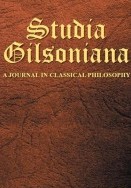TO KNOW OR TO THINK—THE CONTROVERSY OVER THE UNDERSTANDING OF PHILOSOPHICAL KNOWLEDGE IN THE LIGHT OF THE STUDIES OF MIECZYSŁAW A. KRĄPIEC
TO KNOW OR TO THINK—THE CONTROVERSY OVER THE UNDERSTANDING OF PHILOSOPHICAL KNOWLEDGE IN THE LIGHT OF THE STUDIES OF MIECZYSLAW A. KRAPIEC
Author(s): Tomasz DumaSubject(s): Philosophy
Published by: International Étienne Gilson Society
Keywords: thinking; cognition; philosophy; knowledge; reality; abstract; sign; understanding; metaphysics; realism; Mieczysław A. Krąpiec;
Summary/Abstract: The article concentrates on the specificity of philosophical cognition. Referring to Mieczyslaw A. Krapiec’s study, the author proves that the process of thinking is not to be necessarily identified with the process of cognition, as in fact the former is merely a secondary phase of the latter. When identified with thinking, the philosophical cognition would undermine the very sense of cognition, which means the understanding of reality. When based on thinking alone, philosophy does not grasp real things, but operates with abstracts of being and being’s representations (concepts). As for the correctness of philosophical thinking the laws of logic, with ensuring non-contradictory operations, are sufficient enough. However, any knowledge that aspires to be philosophical has to start from really existing beings. In the next phases of cognition, such beings are grasped more and more particularly and precisely—starting from their transcendental properties and principles, then their structure and categorial properties, and finally their individual characteristics and actions. The very first act of cognition is directed to real beings, which are immediately grasped in respect of their existence and real essence. The second act of cognition deals with signs. The precedence of being in human cognition makes the philosophy charged not with a task of thinking about the world, but with the task of knowing and understanding it within possible and verifiable limits. Therefore, according to Krapiec, the very first philosophical discipline is metaphysics, which has real beings as its object. Thus, philosophical cognition should preserve its objective character, as this is the only way to guarantee its realism.
Journal: Studia Gilsoniana
- Issue Year: 2014
- Issue No: 3
- Page Range: 277-299
- Page Count: 23
- Language: English

